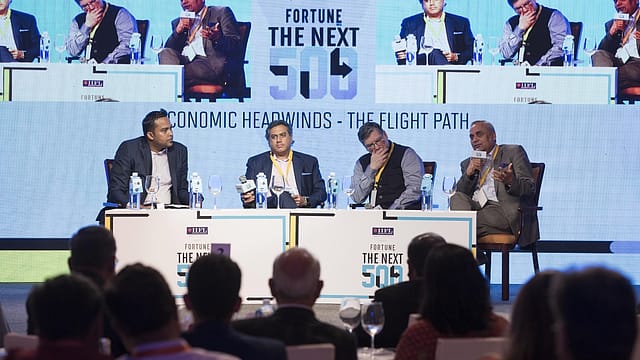‘Economic fundamentals strong, but challenges remain’
ADVERTISEMENT

India continues to fare well on economic indicators, but there are some domestic and external challenges that have to be managed, said industry leaders at the Fortune India Next 500 Summit held in Gurugram recently.
Speaking at a panel discussion titled “Economic headwinds: The flight path”, Rahul Munjal, chairman and managing director, Hero Future Energies, said that India has to face up to a volatile world. India had been resistant to external shocks traditionally thanks to its diversified economy. However, that has not been the case in recent years. “Volatility is the new norm, we have to get over the fear of volatility, and if this is what the world is going to be, let’s learn to live with it,” he said.
Though the country is improving on the ease of doing business index, challenges such as fluctuating commodity prices and exchange rates, and lack of basic infrastructure persist.
Anil Chaudhry, country president and MD, Schneider Electric, says that the Indian economy is showing strong fundamentals and it continues to be among the few countries registering a growth rate 7-7.5%.
“All these indicators are very positive… but there are still some headwinds which we have to manage (like) the dollar-rupee exchange rates… we have to work on some of the core infrastructure, and the speed of the projects, these are some of the challenges which are still to be managed,” Chaudhry says.
Munjal, who runs the clean energy arm of the Hero Group, also said that while renewables are growing at a fast pace, land acquisition is still difficult.
“5% or 8% of our project value is land, but 95% of my problem is land. If we are going to buy 2,000 acres of land a year, or 5,000 acres of land a year, you are going to deal with 5,000 farmers or land owners. It’s not an easy transaction, but that comes with the territory of being in India, of working in India,” he said.
Munjal believes that to solve all these problems politicians, the bureaucracy and the judiciary need to work together and have a unified vision.
“The judiciary makes laws without consultation, bureaucracy does what they want to do at their own pace, and the politicians are moving at a different pace. So if we don’t have all three of them running at the same pace… progress becomes more difficult,” he says.
Talking of the prerogatives of the next generation, Chaudhry says that the next set of problems that the country is going to face will be very different from the traditional needs of food, shelter, and clothing. He also says that the infrastructure of cities will have to be prepared to deal with the vast influx of people moving from rural to urban areas over the coming decade.
“The next generation is all about access to energy and digital connectivity. These are going to be the fundamental human rights,” Chaudhry says. He also emphasised the importance of skill development, which he says is important for helping big global companies to scale up in India and find the right kind of people to work. Investment in education, he says will have a multiplying impact in creating a skilled workforce and responsible citizens.
Meanwhile, Dilip Chenoy, secretary general, FICCI, says that the challenge for the political leadership is that a lot of things that need to be done will produce results in the medium and long term.
“You are planting a tree whose shade will be enjoyed by the future generation, and might not necessary translate into votes at the next election,” says Chenoy, adding that in the short term, execution of all major policies like the National Health Protection Scheme, anti-corruption bill, and agriculture reforms, will be key for the country to develop scale and growth.